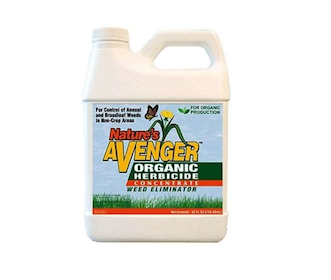Natural Weed Control
Modern science has given us an arsenal of chemicals that do an awesome job at keeping unwanted weeds out of our yards, gardens, and landscaped areas. Unfortunately, there's a good reason they're so effective: they're toxic, and not just to the weeds they target. This article will look at some safer, more natural ways to control weeds.
Natural Weed Killer Products
There are lots of 'natural' weed killer options on the market today. Instead of toxic, manmade synthetic chemicals, these ready-to-us products contain natural alternatives to do the job.
Most natural weed killers use a biodegradable herbicidal soap containing potassium salts of fatty acids; they work not at the root, but on the plant's leafy surfaces. By disrupting the photosynthesis process, the plant slowly dies.
Natural weed killers can also be made from citrus-based herbicides containing d-limonene (as well as castor oil) to kill the plant.
It may not come as a surprise to learn that natural weed killers sometimes just don't work as effectively as more traditional toxic chemical weed killers. It also may not be too surprising that commercial natural weed killers can be very expensive, but they are a viable option for those looking for chemical-free outdoor spaces. One important tip: While chemical weed killers can often target weeds without harming other plants (like grass), natural weed killers will damage or kill any plant, so it's crucial to use care when using them.
Do-It-Yourself Natural Weed Killers
There are alternatives to commercial weed killers. One way would be to make your own weed slayer with inexpensive natural ingredients found around the house. The following ingredients can be mixed into a water solution to spray on weeds:
Vinegar: Natural vinegar contains acetic acid, which acts as a desiccant to remove moisture. When sprayed on weeds, moisture in the leaves is drawn out, killing the top of the plant. A full-strength vinegar solution will be the fastest-acting and kill the weed more completely. Vinegar will often not kill the root completely, meaning repeated applications will be necessary.
Citrus oils from oranges or lemons are also acidic and work in much the same way as vinegar.
Soaps: Often added to vinegar sprays to improve absorption. A natural liquid dish detergent works well; soap will break down the waxy surface found on many weeds, making the spray more effective. Soap also helps spray stick to leaves rather than running off. 1 ounce of soap per gallon is sufficient.
Salt: Any kind of salt (rock salt, table salt, water-softener salt) will kill a plant. Like vinegar, salt is a desiccant. A mixture of 1 pound of salt per gallon of water sprayed directly on plants will usually kill them.
Salt is troublesome, however. It can remain in the soil, affecting the ability of any nearby plant to grow. We mention it as an option, but don't recommend it.
*** Just because a substance is 'natural' doesn't automatically mean it's safe. As with any substance around the house, use natural weed killers with caution and keep them out of the reach of little ones and pets. Natural weed killing ingredients are non-toxic when used wisely, but ingesting them in any amount can be harmful.
Hand Pulling Weeds
The most natural way to control weeds is to not use any spray at all, natural or otherwise. Many find the act of pulling weeds by hand to be a relaxing, therapeutic experience and a good excuse to be get outdoors. Investing in an inexpensive weed-pulling hand tool
or a stand-up tool such as the Hound Dog Hand Weeder makes the job much easier and ensures the entire plant, root and all, is pulled.
If you're not excited about weeding by hand, paying the kids to do it is another good option. Pay them a penny for each dandelion they pull out of the yard is inexpensive and teaches them the entrepreneurial spirit!
A weed is defined simply as an unwanted plant. If you truly don't mind some weeds in your outdoor spaces, just leave them. Getting away from the idea of a perfect grass lawn with no weeds is a greener, more natural way of looking at our world.
comments powered by Disqus




































































